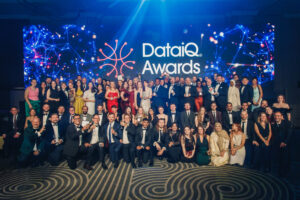Real World Career Progression
Scott Joslin, a data and leadership consultant for DataIQ, moderated the panel and kicked off the conversation by describing his non-linear career path from political theory and statistics to leading global data teams. Cici Whitcomb, a Power Analyst at Shell, discussed her journey from chemistry to data tech, emphasising the importance of mentorship and confidence-building. Cici also highlighted the personal impact of winning the 2024 DataIQ New Talent or Data Apprentice Award which boosted her confidence and reinforced her belief in her capabilities. Jordan Wignall, Head of Data at Energy Saving, highlighted the value of context, conversation, and curiosity in his career progression. Owen Smith, an HR professional who previously worked at Brambles, underscored the role of learning and development in supporting data teams, noting the impact of digital transformation on sustainability.
The panellists emphasised the importance of curiosity, mentorship, and adapting to new challenges in their respective careers:
- Many practitioners feel they must step into leadership to grow, even when their passion and strengths lie in technical work.
- Organisations risk losing exceptional talent if they do not offer dual-track career paths that value deep expertise as much as managerial growth.
Build a Healthy Data Culture
Panellists emphasised the importance of curiosity and learning new tools to enhance business capabilities, and of creating a positive work environment where employees feel valued and supported, even if they eventually leave the company. The focus is on helping employees build their careers, learn new skills, and feel their careers are progressing.
There is a need for resilience and proactivity in the data field, using insights to solve business problems and build momentum. Panellists encouraged attendees to:
- Reflect on their personal leadership style and identify areas for improvement, particularly when responding to negative scenarios.
- Consider the balance between deepening technical expertise and broadening one’s skill set and create a plan to develop a new learning approach.
Following a Q&A session from the audience to the panellists, five core takeaways emerged:
1. Soft skills trump technical mastery over time
Curiosity, proactivity, and business acumen were repeatedly cited as the most transferable and enduring skills. In a landscape where technical tools evolve rapidly, the ability to connect analytics to business value, make sense of ambiguity, and drive transformation holds long-term currency.
2. The rise of the data business partner
There was a strong case for shaping hybrid roles like the data business partner for those who sit at the intersection of data science and business. Building products or insights in isolation is no longer suitable in isolation. Success increasingly depends on understanding context, nurturing relationships, and actively collaborating across functions.
3. Progression Is about influence
Rising in a data career means managing dynamics with peers who may be more experienced or technically advanced. Playing the role of connective tissue between business and tech teams, cultivating mutual learning, and creating environments that encourage continuous development are seen as marks of effective leadership even if the job title does not formally reflect it.
4. Leadership versus specialisation
Panellists shared personal stories of moving between leadership and specialisation or balancing both, highlighting that there is no universal pivot point from technical to leadership roles. The panel championed the twin-track model offering parallel paths for deep technical growth and people leadership.
5. Leadership starts with the self
Self-awareness and personal growth were positioned as the bedrock of good leadership. Cici challenged the assumption that management is the ultimate career step, calling out the false equivalence between leadership and progression. The panel urged data professionals to define success on their own terms, not by outdated hierarchies.
Evolution of the Data Career and Other Considerations
Four groups of data leaders unpacked what it takes to gain visibility, influence, and impact. Their conversations emphasised practical strategies rooted in communication, context, and connection.
1. Build an authentic and action-oriented personal brand
Developing a visible and credible personal brand is about being known for getting things done and not just shameless self-promotion. Data leaders should inject personality into their communication, especially in a world flooded with dry emails and corporate-speak, as this helps signal authenticity and builds stronger engagement.
2. Mentorship and proactivity are multipliers
Mentoring (both giving and receiving) is a powerful career enabler. Data leaders must be proactive in showcasing capabilities. Additionally, most people are willing to offer advice, but do not be afraid to ask for it.
3. Deliverables without context are missed opportunities
Success is delivering outcomes and not just outputs. Participants underscored the value of understanding the broader business landscape and making sure the work delivered is clearly contextualised and aligned with stakeholder needs.
4. Use community and mentorship as strategic assets
The peer network within and beyond an organisation can offer insights, sanity checks, and a sense of solidarity. Chances are, someone else has experienced your difficulties and can help you navigate it faster.
5. Visibility and feedback built into team culture
For people leaders, the role extends beyond task management and includes making sure the team is seen and heard. Establishing regular feedback loops supports individual development and ensures good work does not go unnoticed.
6. Empowerment starts with trust
How managers behave fundamentally shapes how others perceive team members. Trusting your team, letting them own their work, and visibly backing them builds confidence internally and credibility externally.
7. Strategic navigation requires stakeholder awareness
Career progression for data leaders has evolved to hinge less on technical ability and more on navigating influence. Stakeholder mapping was highlighted as a practical tool for understanding who matters, what they care about, and how best to work with them.
The current landscape for a successful data career is no longer a straight line up a technical ladder; it has evolved into a dynamic interplay of influence, visibility, and contextual intelligence. Whether you lead with code, curiosity or commercial insight, progression now depends on how well you connect your expertise to business value, communicate with authenticity, and build trust across disciplines.
DataIQ clients can register for upcoming events including regular meetups where panels and peer-to-peer discussions take place.





